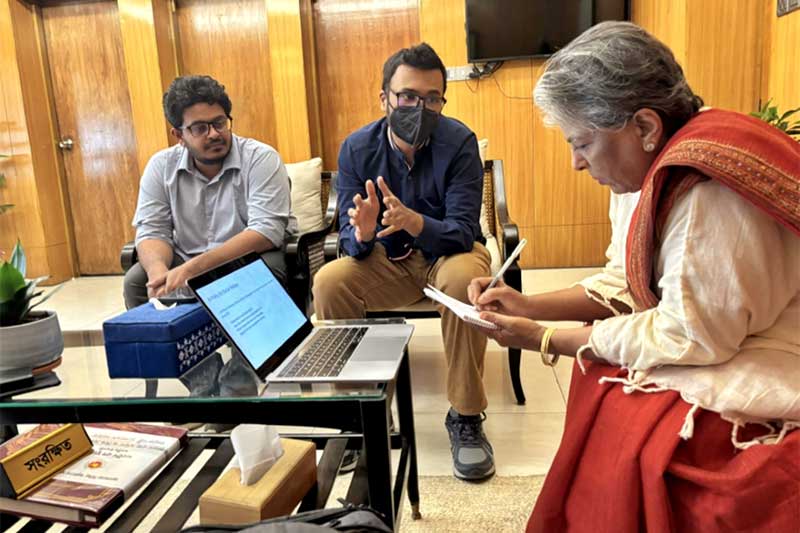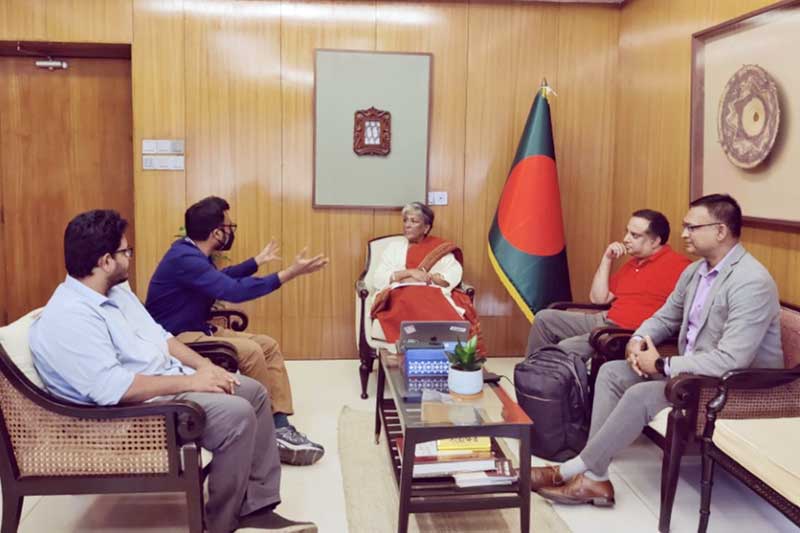Khoury News
The fight to get AI right in Bangladesh, the world’s eighth-most populous country
For Upol Ehsan, helping his native Bangladesh with AI strategy is a deeply personal and consequential mission. "Countries only get one true blank slate in their AI journey," he says, "and Bangladesh is at that inflection point."

This story is the third of a three-part feature on Upol Ehsan and his research. The others detail his work on algorithmic imprints and his work on human-centered explainable AI.
When Khoury College Assistant Professor Upol Ehsan sat for an AI-focused interview with Channel24, one of the largest TV channels in his native Bangladesh, he did not anticipate what would follow.
A 15-minute segment became an engaging, hour-long chat. When it aired, millions tuned in to hear about the importance of AI for Bangladesh, Ehsan’s pioneering work on explainable and responsible AI, his decision to join Northeastern and lead the Human-centered Initiative on Responsible AI Governance and Policy, and why Khoury College and Dean Beth Mynatt are uniquely positioned to lead the future of AI.
The interview catalyzed national interest in Ehsan’s AI vision for Bangladesh. Before long, he was meeting with the Hon. Sharmeen Murshid, the adviser (leader) of Bangladesh’s Ministry of Social Welfare, to discuss the need for AI policy for the ministries under her leadership — and the potential for a national AI task force — in the world’s eighth-most populous country. What was supposed to be a brief 30-minute meeting evolved into a dynamic two-and-a-half-hour discussion.
“Moments like this are rare. Countries only get one true blank slate in their AI journey, and Bangladesh is at that inflection point. It can build an AI ecosystem from the ground up, learning from the mistakes of others,” Ehsan says. “But blank slates are double-edged, and without a national AI policy, the risks are real: deepfake pornography, harassment, fake news. Without care, AI could entrench injustice instead of alleviating it. Doing the right thing from the start is easier than fixing a mistake.”
During the conversation, Ehsan, Murshid, and Bangladeshi business leaders explored how AI could prioritize real-world impact and serve the public good. They discussed the contours of a potential national AI policy and task force, including who might participate. They emphasized the importance of Bangladesh’s hybrid talent — Bangladeshi experts who excel on the global stage yet remain deeply attuned to local needs. Ehsan later shared his vision document (“A Resilient Future: Human-centered National AI Vision for Bangladesh”), which Murshid forwarded to Dr. Muhammad Yunus, Nobel Peace Prize winner and the chief adviser (leader) of Bangladesh's interim government.
There are many hurdles to clear before that vision can be realized. For one, Bangladesh is undergoing political and institutional reforms following a pro-democracy revolution in 2024.
“This type of revolution would have dismantled many countries, but this is where Bangladesh stands out; the people are remarkably resilient,” Ehsan notes.
Technical and institutional gaps remain as well. Ehsan points out that Bangladesh’s AI ecosystem must mature, and its national vision must move beyond generative AI hype to embrace more accountable, purpose-driven technologies.
"Over 65% of Bangladeshis are under 35, and the country has a large freelancing population,” Ehsan observes. “Building AI literacy within this young, trainable workforce will not only help mitigate job displacement, but it will lay the foundation for Bangladesh’s AI future."
Ehsan also highlights the importance of engaging with the Ministry of Social Welfare.

“As a human-centered AI researcher, I wanted to begin with the ministry that serves the most vulnerable populations,” he explains. “The Hon. Adviser, Ms. Murshid, is a sociologist by training and brings a sociotechnical lens to policymaking. She is also a deep thinker, which made the engagement intellectually stimulating.”
Their shared commitment to equity became the foundation for a conversation that bridged policy, ethics, and long-term national strategy.
“I knew I was at the beginning of something meaningful,” Ehsan says. “It's great to have that kind of high-level buy-in. The Hon. Adviser and her team really felt the urgency to make AI safe. This was a conversation many had attempted, but this time, it landed.”
Although Bangladesh’s government is only an interim one, with elections projected to take place in 2026, Ehsan remains optimistic that the work will outlast the moment and spark lasting change. The discussions since that meeting have already proven fruitful; Bangladesh is planning its first National AI Summit, with Ehsan playing a key advisory role in strategizing and shaping the summit’s vision.
“Bangladesh’s AI story must be made in Bangladesh, not imported from elsewhere. I want the foundation to be there so the next government can build on it,” he says. “Bangladesh’s AI story is being written, and I'm honored to have the opportunity to shape its opening chapters.”
The Khoury Network: Be in the know
Subscribe now to our monthly newsletter for the latest stories and achievements of our students and faculty